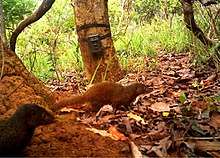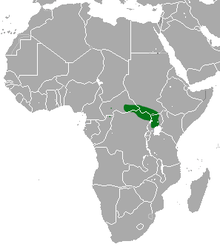Pousargues's mongoose
Pousargues's mongoose (Dologale dybowskii), also known as the African tropical savannah mongoose, is a mongoose native to Central Africa. It is listed as data deficient on the IUCN Red List as little is known about its distribution and ecology.[1]
| Pousargues's mongoose | |
|---|---|
 | |
| Wild Pousargues's mongoose in the Chinko Project Area | |
| Scientific classification | |
| Kingdom: | Animalia |
| Phylum: | Chordata |
| Class: | Mammalia |
| Order: | Carnivora |
| Suborder: | Feliformia |
| Family: | Herpestidae |
| Genus: | Dologale Thomas, 1920 |
| Species: | D. dybowskii |
| Binomial name | |
| Dologale dybowskii Pousargues, 1893 | |
 | |
| Pousargues's mongoose range | |
Up to the late 20th century, it was known from only around 30 zoological specimens in natural history museum collections.[2]
Characteristics
The Pousargues's mongoose is brown with a grey belly and face. Its tail is bushy, and its front feet have strong claws. Its body length is between 25 and 33 cm (10 and 13 in) with a 16–23 cm (6.5–9 in) long tail.[2]
Taxonomy
_-_illustration_originale.jpg)
In 1893, Eugène de Pousargues first described the Pousargues's mongoose on the basis of zoological specimens collected in 1892 near the Kémo River. The type locality corresponds to the former French garrison founded by the Dybowski Mission close to the settlement of Fort de Possel. It is named in honor of Jean Dybowski who collected the specimens. It was initially subordinated to the genus Crossarchus.[3][4]
It is the only species in the genus Dologale.[2]
A genetic study focused on Carnivora highlighted the Pousargues's mongoose to be the sister-species of the genus Helogale.[5]
Distribution and habitat
The Pousargues's mongoose ranges from northern Democratic Republic of the Congo, South Sudan, Central African Republic to western Uganda.[2]
Mongooses sighted and recorded by a camera-trap in 2011 and 2012 in the Central African Republic were preliminarily identified as Pousargues's mongoose.[6]
In 2013, a group of Pousargues's mongooses was observed near Lake Albert in Uganda's Semliki Wildlife Reserve.[7] In 2016, an individual was observed and photographed in Garamba National Park.[8]
Conservation
Field research for the collection of basic data on its ecology is indispensable for designing adequate conservation measures.[2]
References
- Aebischer, T.; Hickisch, R.; Woolgar, J. & Do Linh San, E. (2015). "Dologale dybowskii". IUCN Red List of Threatened Species. 2015: e.T41598A45205821. Retrieved 15 November 2018.
- Schreiber, A., Wirth, R., Riffel, M. and Van Rompaey, H. (1989). "Pousargues' mongoose (Dologale dybowskii)" (PDF). Weasels, civets, mongooses, and their relatives. An Action Plan for the conservation of mustelids and viverrids. Gland, Switzerland: IUCN / SSC Mustelid and Viverrid Specialist Group. p. 59.CS1 maint: multiple names: authors list (link)
- de Pousargues, E. (1894). "Description d'une nouvelle espèce de mammifère du genre Crossarchus et considérations sur la répartition géographique des crossarques rayés". Nouvelles Archives du Muséum d'Histoire Naturelle. 3. 6: 121–134.
- de Pousargues, E. (1896). "Crossarchus dybowskii". Etude sur les mammifères du Congo français. 3 (in French). 8. Paris: Annales des sciences naturelles. Zoologie et paléontologie. p. 318.
- Nyakatura, K. & Bininda-Emonds, O. R. P. (2012). "Updating the evolutionary history of Carnivora (Mammalia): a new species-level supertree complete with divergence time estimates". BMC Biology. 10: 12. doi:10.1186/1741-7007-10-12. PMC 3307490. PMID 22369503.
- Aebischer, T., Hickisch, R., Klimek, M. and Parkison, A. 2013 (2013). "Probable records of Pousargues's Mongoose Dologale dybowskii in the Chinko/Mbari drainage basin, Central African Republic". Small Carnivore Conservation (48): 101–103.CS1 maint: multiple names: authors list (link)
- Woolgar, J. (2014). "A confirmed sighting of Pousargues's Mongoose Dologale dybowskii" (PDF). Small Carnivore Conservation (51): 1–3.
- D’haen, M. (2017). "A confirmed sighting of Pousargues's Mongoose Dologale dybowskii in Garamba National Park, Democratic Republic of the Congo". Small Carnivore Conservation (55): 69–72.
| Wikispecies has information related to Dologale dybowskii |
| Wikimedia Commons has media related to Dologale dybowskii. |
